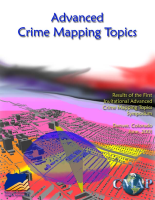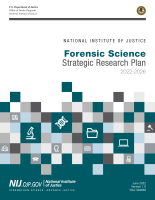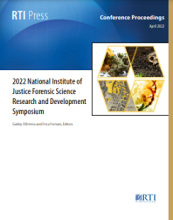Research
What's Possible with Rapid DNA Technology?
NIJ scientist Tracey Johnson joins science writer Sarah Michaud in this episode. They discuss Rapid DNA technology, and Tracey explains the complexities of this technology – its pitfalls and its possibilities.
Reading and Resources from NIJ:
NIJ Multisite Impact and Cost-Efficiency Evaluation of Veterans Treatment Courts
Funding Support for the Operations of the Committee on Law and Justice of the National Academies of Sciences, Engineering, and Medicine
Statewide Law Enforcement Crime Research, Evaluation, and Analysis
A Randomized Controlled Trial of a Comprehensive, Research-Based Framework for Implementing School-Based Law Enforcement Programs
Tribal Crime, Justice, and Safety, Part 2
Stacy Lee Reynolds and Christine (Tina) Crossland continue their discussion of tribal crime, justice, and safety, including how Native American persons experience crime victimization at higher rates than non-Native people and the jurisdictional complexities in responding to tribal crime, justice, and safety. Read the transcript.
Listen to the first half of Stacy and Tina’s discussion.
Reading and Resources from NIJ
Tribal-Researcher Capacity Building Grants
Research Abstract: National Institute of Justice's Multisite Evaluation of Veterans Treatment Courts
Tribal Crime, Justice, and Safety, Part 1
Research indicates that Native American persons experience crime victimization at higher rates than non-Native people. Furthermore, the unique position of American Indian and Alaska Native tribes as both sovereign nations and domestic dependents of the U.S. creates jurisdictional complexities in responding to crime, justice, and safety. Senior social and behavioral scientist Christine (Tina) Crossland discusses NIJ’s research on these topics, especially on the prevention of violence towards American Indians and Alaska Natives. Communications Assistant Stacy Lee Reynolds hosts.
The Evidence We Leave Behind, Part 2
Crime and Justice: A Review of Research, Volume 30
Firearms Regulation: A Historical Overview (From Crime and Justice: A Review of Research, Volume 28, P 137-195, 2001, Michael Tonry, ed. -- See NCJ-192542)
Incivilities Thesis: Theory, Measurement, and Policy (From Measuring What Matters: Proceedings From the Policing Research Institute Meetings, P 65-88, 1999, Robert H. Langworthy, ed. -- See NCJ-170610)
Research Into Action: The Approach of the National Institute of Law Enforcement and Criminal Justice
Making Sense of DNA Backlogs - Myths vs. Reality
Fingerprint Sourcebook - Chapter 14: Scientific Research Supporting the Foundations of Friction Ridge Examinations
Research at the Faculty of Criminal Justice and Security, 2001-2005 (A Collection of Research Abstracts)
Research at the College of Police and Security Studies Ljubljana, Slovenia 1996-2001: Book of Research Abstracts
Advanced Crime Mapping Topics
Research on Violence Against Women and Family Violence: The Challenges and the Promise
Death Investigation: A Guide for the Scene Investigator
National Institute of Justice Forensic Science Strategic Research Plan, 2022-2026 (Version 1.1)
Conference Proceedings: 2022 National Institute of Justice Forensic Science Research and Development Symposium
Taking Stock: An Overview of NIJ's Reentry Research Portfolio and Assessing the Impact of the Pandemic on Reentry Research
Over several decades, the National Institute of Justice (NIJ) has made significant contributions to the field of reentry, specifically what works for whom and when. In recent years, however, the global pandemic has made it increasingly difficult to conduct research on and with populations involved with the justice system. During this time, many researchers assessing various justice-related outcomes were unable to continue their inquiries as planned due to a lack of access to their populations of interest, forcing many to pivot and rethink their research designs.
See the YouTube Terms of Service and Google Privacy Policy







